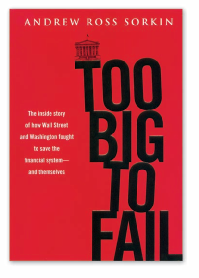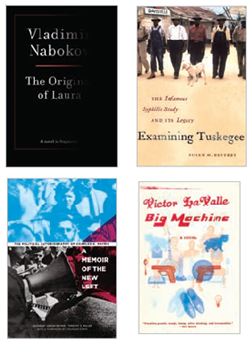Too Big to Fail by Andrew Ross Sorkin ’99 (Viking)
Too Big to Fail by Andrew Ross Sorkin ’99 (Viking)

The New York Times‘s chief mergers and acquisitions reporter tells the behind-the-scenes story of the worst financial crisis since the Great Depression and the federal government’s efforts to craft a bailout. Drawing on phone logs, daily calendars, and extensive interviews with industry executives, the White House, and Cabinet officials, Sorkin recreates the minute-by-minute struggle to avert an economic meltdown. As large investment banks and insurance giant AIG tumbled, regulators and financiers were forced to improvise a solution. “It was the sense of utter uncertainty that made the crisis a once-ina-lifetime experience for the men who ran these firms and the bureaucrats who regulated them.”

The Original of Laura by Vladimir Nabokov, edited by Dmitri Nabokov (Knopf). The acclaimed writer and popular Cornell professor left his final novel unfinished and gave instructions to destroy the manuscript of 138 handwritten note cards after his death. Thirty years later, his son, Dmitri, decided to go against his father’s wishes and publish the book, which tells the story of Philip Wild, his promiscuous wife, Flora, and the roman à clef “Laura,” written by one of Flora’s lovers. Although the novel ends in a series of notes and tantalizing fragments, Dmitri argues that it “would have been a brilliant, original, and potentially radical book” had it been completed.
Examining Tuskegee by Susan M. Reverby ’67 (North Carolina). The U.S. Public Health Service ran the infamous Tuskegee Syphilis Study from 1932 to 1972, recruiting African American farmers for research in the progression of untreated syphilis. “It is impossible to separate the shifting ideas and beliefs about race from the complexity of the changing medical questions about syphilis and the ethics of doing research,” writes Reverby, a professor of the history of ideas and women’s studies at Wellesley College. She analyzes “why the study happened, how it might have been stopped, and why the stories go on and on.”
A Memoir of the New Left by Charles A. Haynie ’57, edited by Aeron Haynie and Timothy S. Miller (Tennessee). Beginning with his political awakening at Cornell during the anti-nuclear movement in the late Fifties, Haynie recalls his days as field director of a voter registration drive in Tennessee from 1963 to 1965, an antiwar organizer with Massachusetts Political Action for Peace in 1967, and an organizer of the Buffalo Unity Day rally to foster racial harmony. He argues that a top-down approach to history does a disservice to the ordinary people who became politicized and joined the civil rights and anti-war movements.
Big Machine by Victor LaValle ’94 (Spiegel & Grau). Ricky Rice works as a janitor in a bus station in Utica, New York, is the only survivor of a death cult, and is trying to kick heroin addiction. He thinks he can hide from all the things he’s done to people and that they’ve done to him—until he gets a cryptic note about a promise he once made to be brave. Ricky sets off on an odyssey that begins when he journeys to Vermont and meets the Unlikely Scholars, a secret society of “spiritual X-Men” who investigate the paranormal at the Washburn Library and seek a mysterious being known as “the Voice.”
Recently Published
Poetry
This Is the Red Door (Ironweed) and The Goddess of Goodbye (Word) by James R. Whitley ’88. Two collections that explore redemption and loss from the winner of the Ironweed Poetry Prize.
Non-Fiction
Raymond Adams by Robert Laureno ’67, MD ’71 (Oxford). An oral history and biography of a groundbreaking twentieth-century neurologist who left his mark on the fields of psychiatry, pediatrics, and psychology as well as neurology.
Harnessing Globalization by Roy C. Nelson, PhD ’91 (Penn State). A professor at the Thunderbird School of Global Management shows how Brazil, Chile, and Costa Rica take advantage of globalization by attracting foreign direct investment.
Better, Stronger, Faster by Brad Rosser, MBA ’88 (Infinite Ideas). The former right-hand man of Richard Branson at Virgin gives advice to entrepreneurs on how to build a successful business and avoid the pitfalls that cause many start-ups to fail.
Champion of Civil Rights by Joel William Friedman ’72 (LSU). A biography of John Minor Wisdom, a judge for the Fifth Circuit, U.S. Court of Appeals, who wrote many decisions that helped desegregate the South.
Stalin in Russian Satire, 1917-1991 by Karen L. Ryan ’80 (Wisconsin). Russian writers have portrayed Stalin as a devil, a madman, a beast, or a monster, and the dictator still haunts Russia’s psyche, argues a professor of Slavic languages and literatures at the University of Virginia.
Salt Marshes by Judith S. Weis ’62 and Carol A. Butler (Rutgers). Once viewed as wastelands, salt marshes have been either drained or used as dumping grounds for centuries. Weis, a professor of biological sciences at Rutgers, and her co-author outline the current knowledge about wetlands, which underscores their benefits for people and wildlife.
On Friendship by Matteo Ricci, translated by Timothy Billings, MFA ’91, PhD ’97 (Columbia). Ricci, a sixteenth-century Italian Jesuit missionary, was the first European to write a book in Chinese. It became a bestseller during the Ming dynasty. Billings, a professor of world literature at Middlebury, translates Ricci’s text and provides an essay on the book’s cultural and historical background.
Flourishing in Later Years edited by James Michaels ’68 and Cary Kozberg (Victoria Press). Two rabbis edit an anthology devoted to Jewish perspectives on long-term pastoral care.
The Provocative Joan Robinson by Nahid Aslanbeigui and Guy Oakes, PhD ’68 (Duke). Two professors at Monmouth College chart the career of British economist Joan Robinson, a colleague of John Maynard Keynes, and show how she rose to prominence in the male-dominated Cambridge University of the Thirties.
Theatre Is More Beautiful Than War by Marvin Carlson, PhD ’61 (Iowa). An overview of the major stage directors, actors, and set designers of German theater since the late Sixties, by a professor of theater at the City University of New York.
The Supreme Court and the Idea of Constitutionalism edited by Steven Kautz, Arthur Melzer ’71, Jerry Weinberger, and M. Richard Zinman ’65. Constitutional scholars discuss the proper role of the Supreme Court as the defender of our rights and the watchdog of the Constitution.
Heart Language by Susan Colestock Hill (Penn State). A study of fiction about Pennsylvania German culture by Elsie Singmaster 1902.
Where the Rivers Meet the Sky by Tim Kennedy, PhD ’84 (Alaska). A field worker recounts his experiences in participatory development in Native Alaskan villages.
Town Born by Barry Levy ’68 (Penn). Indentured servitude was a common practice throughout the American colonies, but not in New England, where town meetings brought a measure of equity to local labor practices.
Blood and Culture by Cynthia Miller-Idriss ’94 (Duke). Using research conducted at German vocational schools, an assistant professor of educational sociology at NYU examines how the current generation of young Germans is trying to create a national identity for itself sixty years after the Holocaust and World War II.
At the Font of the Marvelous by Anthony Wonderley, PhD ’81 (Syracuse). Iroquois and Algonquian folktales preserve voices from the past and enlarge our understanding of Native American religion and thought, argues the curator of the Oneida Community Mansion House.
This Hungry Spirit by C. Clinton Sidle ’74, MBA ’77 (Larson). The director of the Roy H. Park Leadership Fellows writes about “unraveling the socialized, conditioned self to discover a truer or more authentic self.”
Knit Green by Joanne Seiff ’95 (Wiley). A fiber artist shows how to knit in environmentally conscious and sustainable ways, using recycled yarns, “green” synthetics, naturally colored cottons, and locally grown wool.
Thoreau’s Democratic Withdrawal by Shannon L. Mariotti, PhD ’06 (Wisconsin). Reading Thoreau through the lens of Theodor Adorno’s social theory, an assistant professor of political science at Southwestern University argues that Thoreau’s withdrawal from public life allowed him to regain critical perspective on society.
Institutional Critique edited by Alexander Alberro and Blake Stimson, PhD ’98 (MIT). A professor of art history at UC Davis and his colleague bring together essays by contemporary artists that question the institutional power of the museum and its role in the public perception of art.
Artisanal Gluten-Free Cooking by Kelli Bronski ’01 and Peter Bronski ’01 (The Experiment). The authors provide more than 250 recipes for people with gluten intolerance, wheat allergies, or celiac disease and show how to safely navigate the supermarket and keep a gluten-free kitchen.
Killing Green by Elaine Koretsky ’53 (The Legacy Press). The director of the International Paper Museum gives an account of traditional hand papermaking in China.
Ugly Stories of the Peruvian Agrarian Reform by Enrique Mayer, PhD ’74 (Duke). Between 1969 and 1999, Peru underwent land redistribution. Drawing on interviews with peasants, landowners, activists, politicians, and government officials, a professor of anthropology at Yale shows the effects of the contentious process on society.


